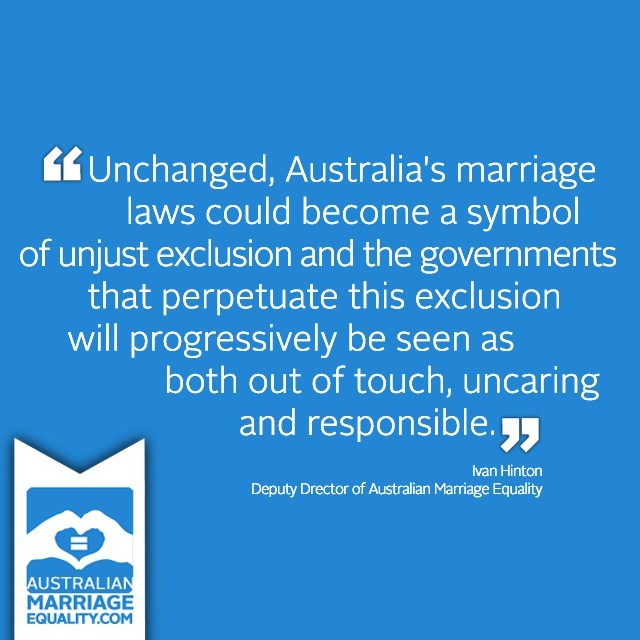THE ACT government fought and won the most recent territory election on a platform that included marriage equality.
The territory also has a long reform agenda of removing discrimination wherever it exists.
If this isn’t mandate enough for it to pass a law allowing same-sex couples to marry, the territory has the highest proportion of same-sex couples in the nation and has been on a trajectory to complete equality for these couples since its unprecedented civil union law in 2006, and as far back as the nation’s first recognition of same-sex de facto couples in 1994.
If Tony Abbott wants the nation to respect his mandate to repeal the carbon tax and stop the boats, he must also respect the territory’s mandate to legislate for the equality of all its citizens.
Some opponents of reform, such as Lyle Shelton from the Australian Christian Lobby, argue that the territory doesn’t have the right to “redefine” marriage for the nation.
I’d contend that same-sex mariage doesn’t “redefine” the institution. It only expands its current definition to include more couples who want to uphold its values.
The redefinition argument also only works in isolation. If we include the determined work of a growing number of our closest allies and neighbours it’s clear that the ACT isn’t redefining marriage, it’s simply keeping up with the conscious, informed and deliberate decisions by many other governments around the world to remove unjust prejudice from its laws.
Opponents also say the ACT process should be slowed down to allow for more consultation.
There have already been three major federal parliamentary inquiries into marriage equality, the latest of which received over a quarter million submissions, 64 per cent in favour, and recommended in support of reform.
The NSW parliament has issued its own report confirming that states and territories can pass laws for same-sex marriage.
The territory government will allow several weeks for feedback on its bill, after taking the policy to the community in their recent successful election.
All up, that’s more than enough consultation. It’s time to get on with a reform the clear majority of Australians support.
Another objection is that same-sex marriages conducted in the ACT could be annulled if the High Court overrules the law under which these marriages were solemnised.
We know that while opponents of reform will challenge any law at a state, territory, or federal level that allows loving and committed same-sex couples to marry, that threat does not justify delaying what many see as overdue reform.
The final area of concern is that state and territory laws would create a patchwork of marriage laws.
All relationship law reform in Australia began first at a state level before “migrating” to the federal sphere.
This includes heterosexual marriage, opposite-sex de facto relationships, same-sex de facto relationships and civil partnerships.
In each case the logic of federalism meant that newly recognised relationships in one jurisdiction were quickly recognised in others.
It will be the same with same-sex marriages.
We will see technical, legal and constitutional objections to a territory marriage equality law in the coming days and weeks.
But they should not be allowed to obscure the fundamental right of same-sex couples to fairness, and the equally fundamental right of the people of the ACT to self-government.
The notion that it is possible for Australia’s marriage laws to avoid increasing scrutiny and criticism is delusional.
It is clear that our community is not isolated from the global experience and our attitudes supporting inclusion, dignity and respect for all Australians, regardless of their orientation, will not suddenly experience an about-face.
Unchanged, Australia’s marriage laws could become a symbol of unjust exclusion and the governments that perpetuate this exclusion will progressively be seen as both out of touch, uncaring and responsible.
While our federal government continues to catch up with the growing support for reform, and more rights and respect for same-sex couples are available in New Zealand than offered at home, it is time for the ACT to get this done.
Ivan Hinton is the deputy director of Australian Marriage Equality and its main advocate in the ACT.

